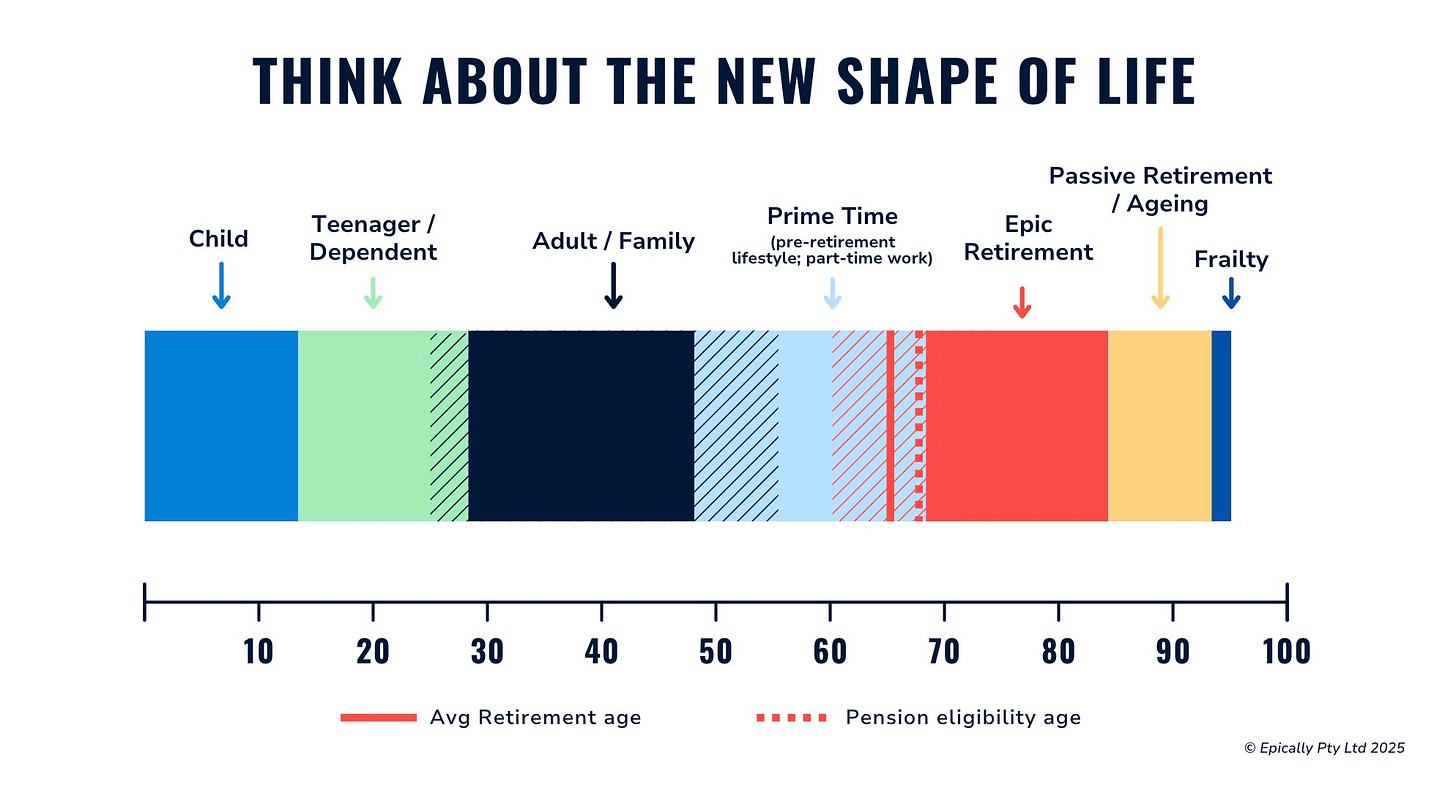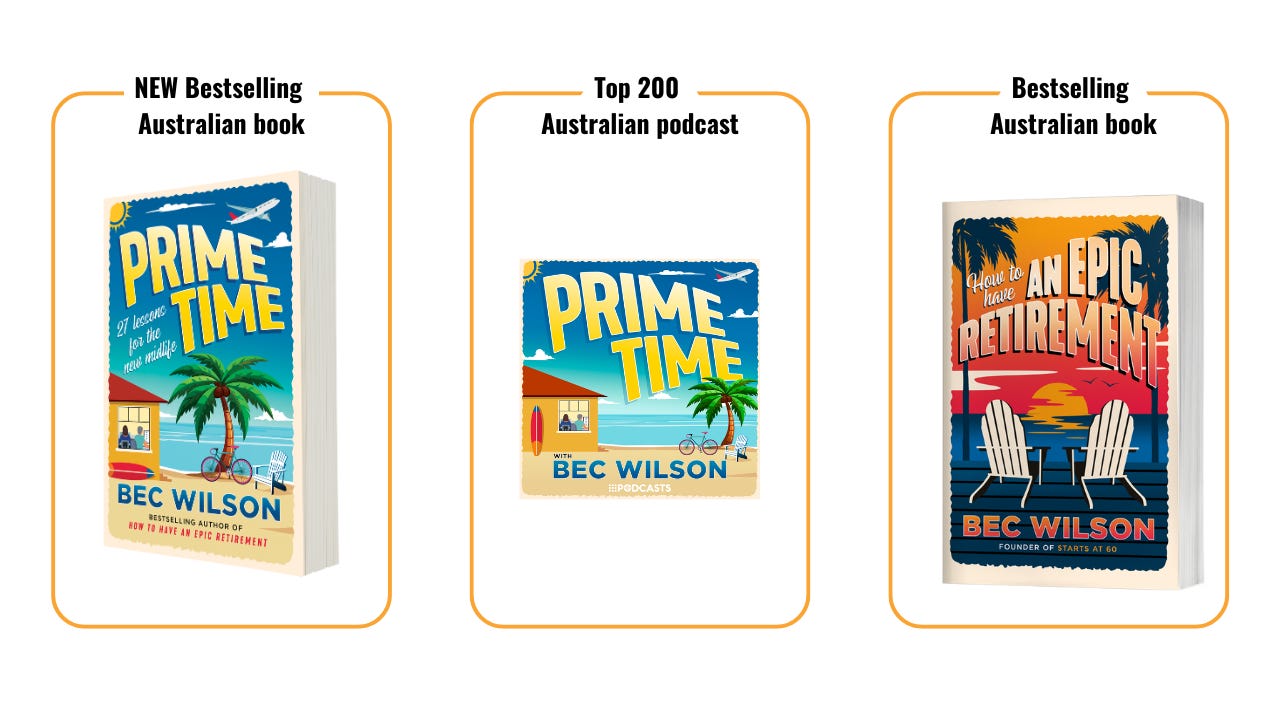Are you a Prime Timer? Finding your place in the second half of life
Across the UK, Europe, North America and beyond, we’re seeing the same shift: people in their late 40s, 50s and 60s approaching life differently.
Two weeks ago in Australia I launched a new book called Prime Time: 27 Lessons for the New Midlife. While that edition was written with Australians in mind, the concept at its heart is very globally relevant I think. The idea in the book is that we can enjoy a new stage of life BEFORE we retire. Across the UK, Europe, North America and beyond, we’re seeing the same shift in life expectancies and work flexibility: people in their late 40s, 50s and 60s approaching life differently. They’re not rushing to use the R-word too early, instead many are simply ready to start shaping their lives, doing less of the things they don’t like and more of the things they really enjoy.
This new stage isn’t about winding down early. It’s about understanding earlier in life how you should be planning for flexibility and retirement later; then reimagining what you want to spend your time and skills doing. It’s about working hard earlier so you can step into a midlife phase of life where you put yourself first. It’s something I call Prime Time.
The new stage between ‘adulting’ and retirement
For generations, the script was predictable. Grow up, get educated, buy a house, work hard, raise kids, pay the mortgage, and then — if you were lucky — retire.
But that narrative doesn’t fit anymore. Not when people in their 50s and 60s are healthier, living longer, and more determined than ever to enjoy a good life before they retire. And with the pension schemes, savings systems, and investment options now available — along with the years of groundwork already behind us — it’s becoming more and more possible to do just that. Retirement, as we’ve known it, is simply too small (and too late) a box to contain this chapter of life.
Your Prime Time is what comes after the heavy responsibilities of “adulting” but before full retirement. It’s the stage where you start to experience more freedom, flexibility and choice — but you’re not ready to put your feet up for good.
My turning point
For me, my Prime Time started at 47 and a half, when I hit burnout. My career had once felt meaningful, but by then I was overperforming at work, raising three kids, and underinvesting in everything else — my health, my creativity, my joy.
The stop wasn’t elegant or planned. It was messy, scary, and forced me to start again: income, identity, purpose. But it was also a gift. It made me pause long enough to ask: What do I actually want from the second half of my life? And it helped me acknowledge a lot of things I didn’t want to do as well as plenty of things I did want to pursue.
That question is at the heart of being a Prime Timer.
“What do you really want from the second half of life?”
The midlife dip (and bounce)
It turns out I wasn’t alone. Data shows that across the world, people’s life satisfaction dips somewhere between 47 and 55. It doesn’t matter whether you live in London, Sydney, New York or Berlin — it’s there in the numbers.
For some, that dip feels like a crisis. For others, it’s the catalyst for change or growth. Either way, it’s a turning point — and it’s exactly where your Prime Time begins. To me your Prime Time comes before an Epic Retirement - and we can make the most of both if we know how to plan for them.
Why this generation is different
Here’s what makes today’s 50- and 60-somethings different from our parents’ generation:
We’re living longer. A 50-year-old woman in the UK today can expect to live into her mid-90s. In Australia, Canada, and much of Europe, it’s the same. That means there’s more likely to be decades ahead of us, not just a few years. Give up work too early and you could find yourself aimless. But find purpose now - and you could benefit for many years to come.
We’ve been saving. Whether it’s superannuation in Australia, workplace pensions in the UK, 401(k)s in the US, private savings in New Zealand or occupational pensions across Europe, we’ve spent decades contributing. Now those balances are starting to matter.
We’ve got perspective. After years of juggling families, careers, and mortgages, we’ve learned what matters to us. And at this stage of our lives, we’re less inclined to chase someone else’s idea of success.
We’ve got choices. Technology, flexibility, and shifting work cultures are reshaping what’s possible. With staffing shortages, and changing work-structure expectations, second-act careers, part-time consulting, remote work, volunteering, and creative ventures are now genuine options. For our parents, most of these pathways simply didn’t exist.
We might also have to change. Ageism in the workplace is real, and new technologies like AI are reshaping industries in ways that can push midlifers out before we’re ready. Careers we once thought were secure may not be future-proof. But that’s also why this stage of life matters — because if we stay flexible, keep learning, and lean into new opportunities, we can adapt and thrive rather than be sidelined.
We are the first generation to arrive at midlife with this blend of longevity, financial foundations, and opportunity. And that gives us choices no one before us has had.
The three financial and lifestyle phases of your Prime Time
I think of Prime Time as three broad phases:
1. The setup phase
This is where you reset. You take stock of your finances (pension pots, ISAs, super balances, 401(k)s — whatever applies in your country). You get clear on what’s “enough” for you. You re-prioritise your health. You rediscover interests you’d shelved while raising kids or climbing ladders.
2. The lifestyling phase
This is where you’re still working, usually full-time, but you start shifting the balance. In the UK, that might mean using flexible working laws to compress hours or take longer breaks. In the US, it might be negotiating remote work or taking a sabbatical. In Europe, some employers actively encourage midlife reskilling or downshifting. Whatever the path, this is where you bring more joy, travel, and self-investment into your everyday life.
3. The part-timing phase
This is my favourite. It’s the sweet spot where you don’t fully retire but redesign work to fit around life. Some people move to three or four days a week. Others consult, freelance, or turn a passion into a lifestyle business. Many combine this with extended travel, creative pursuits, or volunteering. It’s flexible, energising, and for many, far more fulfilling than the old model of “full stop” retirement.
Global examples of Prime Timers
We’re seeing Prime Timers everywhere:
In the UK, many over-55s are choosing “semi-retirement,” drawing down part of their pension while continuing to work fewer hours.
In the US, the concept of an “encore career” — using midlife skills for purpose-driven work — has taken off.
In Europe, phased retirement schemes allow people to gradually reduce hours over several years while keeping benefits.
In Australia and New Zealand, flexible work and self-employment are increasingly popular as people seek to balance lifestyle and income.
Different systems, same desire: to make the second half of life count.
So, what is a Prime Timer?
A Prime Timer is someone who sees this stage not as the beginning of the end, but as the start of something exciting. Someone who says: I’m not done. I’m just getting started in a new way and I’m not looking to retire - just redesign how I do life.
It’s less about your age and more about your mindset. If you’ve started asking, What’s next? What lights me up now? — you’re already in your Prime Time.
And that’s why I think this idea resonates globally. Because no matter where you live, no matter what your pension system looks like, the truth is the same:
We’re not past our prime time of life. We’re in it. And after we’ve had a Prime Time, we want an Epic Retirement too. We just have to learn how to make it happen - ideally earlier so we can take better advantage of time and compounding.
Do you think the Prime Time lessons resonate where you are? Tell me about how you feel in the comments.
Epic Retirement has been the centre of my work for a while now — and over the last few months we’ve been preparing for to bring it to the UK and New Zealand. My goal is simple: to help people everywhere think differently about modern retirement, to understand the systems in their country; and to embrace the opportunities a longer, better-quality second half of life can hold.
Alongside that, Prime Time — my newest book in Australia — has already become a bestseller back home. While it was written for Australians who needed it right now, the ideas at its heart are universal and they drop in perfectly AFTER Epic Retirement has launched. Because the truth is, people in the UK, USA, Canada, and New Zealand are asking the same big questions: how do we make these years in midlife, before we retire better? How do we live in a way that retirement is no longer the ultimate goal - ‘choice’ is. How do we create a retirement plan and budget earlier; and then map out a pre-retirement life stage we can get excited about?
Having just wrapped the manuscripts for three countries, I’m struck by how much we can all learn from each other. Different systems, yes, but the same universal lessons about using those systems to get ahead, then on how to adapt to the freedom and understand the many choices available to you along the way. And many of these choices are new.
Now - on a different note - I’ve got good news: I’ve just booked to visit the UK a couple of times in the months ahead. First stop is the Pensions UK Conference (recently rebranded from the PLSA), where I’ll be speaking — which feels pretty epic, if I’m honest. Then I’ll be back in January to take the new UK edition of How to Have an Epic Retirement on tour.
Now here’s where I need you: if your town has a brilliant bookshop, library, or community venue that hosts great events, or there’s a radio show or podcast you think we should seek out appearing on; let me know. I’d love to bring some warmth to the UK winter and share the lessons of Epic Retirement in person. So drop me a line! You can do it simply by replying to this email.
If you’re interested in staying in the loop on the books I’ve set up expression of interest pages where you can register to learn more, see the cover reveals and get the first option to pre-order when it becomes available.
We should have the first cover designs soon!
And that’s enough for this week. Have a lovely Sunday - wherever in the world you are. I’m off to sleep down under!
Many thanks! Bec Wilson
Author, podcast host, columnist, retirement educator, and guest speaker
Want to buy the books overseas?
You can purchase a copy as an ebook from Amazon, or Apple Books online - or get them as an audiobook worldwide from your favourite online bookseller (Spotify Plus or Audible).
Do you know someone who would like this newsletter? Send it to them and suggest they sign up. It’s free.







Bec this is a great post which resonated with me. I am already part time (non exec director) and will shift down further. Finances are ok. How do I find my passion and purpose?
It seems like I saw my future